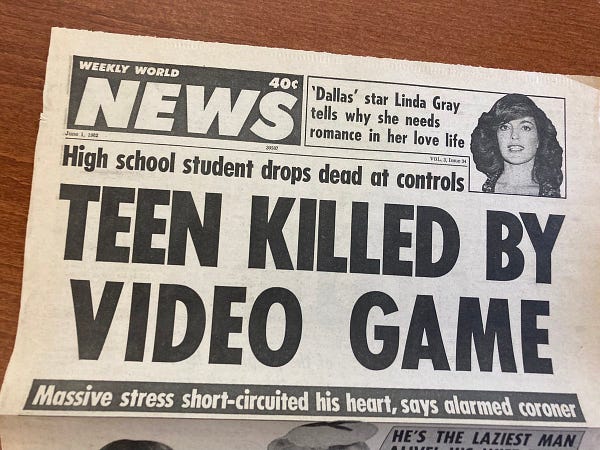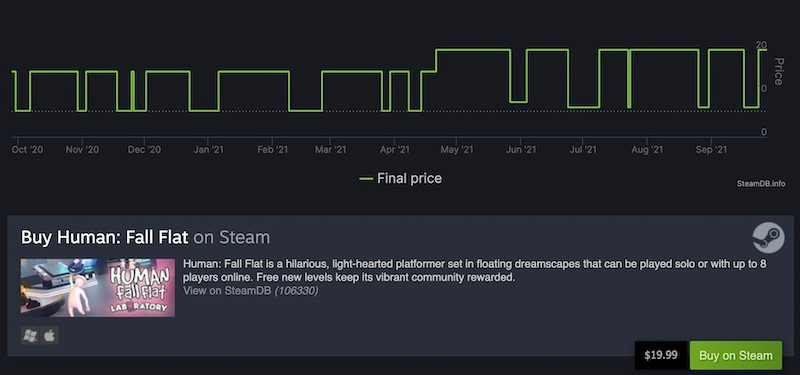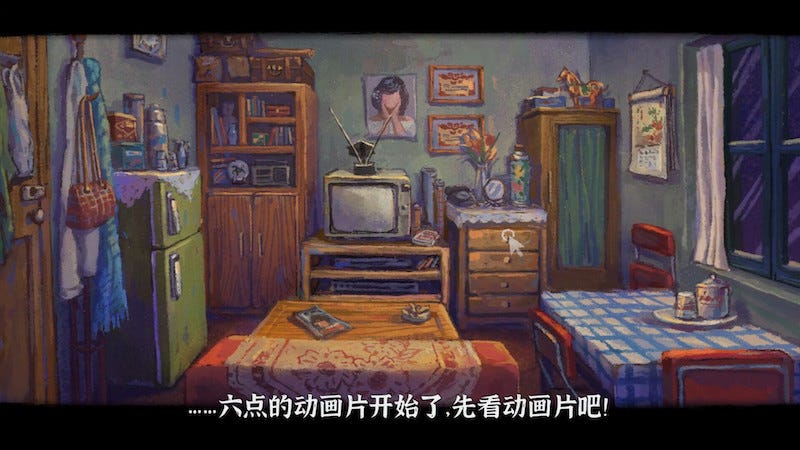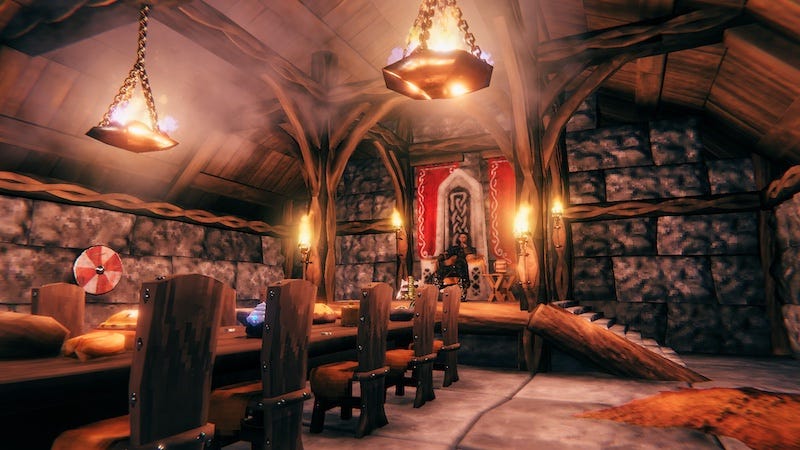Your game's on sale too often? Players say that's unlikely!
Publikováno: 28.9.2021
Dispelling a myth I'm interested in poking at.
[The GameDiscoverCo game discovery newsletter is written by ‘how people find your game’ expert & GameDiscoverCo founder Simon Carless, and is a regular look at how people discover and buy video games in the 2020s.]
I bid good welcome to you, kind folk. Here at the faux-medieval GameDiscoverCo newsletter, we’ll be splitting some wood for winter, getting our steeds ready for the jousting tournament, and… what’s this, giving you helpful feedback on how to sell your video game in 2021? Prithee, that doth sound so helpful!
But seriously, welcome back to the actual 21st century, and thanks to everyone who supports this here newsletter. We’re having a lot of fun cranking out useful knowledge to you all, and that trend continues… now.
[We cherish you, new members of our GameDiscoverCo Plus paid subscription - including exclusive weekly newsletters, an info-filled Discord, our Steam Hype back-end for analyzing unreleased games, our excellent ‘Game Discovery Toolkit’ eBook, & lots more - join today!]
Is putting your game on sale too often.. bad?

So this newsletter is going to follow up on a piece on discount strategy for your games that we published back in January. Our claim at the time was “some game makers don’t spend enough time being 100% methodical about discount timings and amounts”, and we particularly focused on the following tactics:
Frequency: you should discount your games at every available opportunity. Not necessarily at massive percentages to start with, though!
Amount: it’s our view that gradually increasing discounts is the best practice. (You decide how low you want to go, btw. Some go to 60% off over a couple of years, some are more conservative - esp. if the game is being actively developed.)
The second point seems fairly non-controversial, but the first one can sometimes rub developers up the wrong way. It can feel like a large amount of discounts every year is in some way ‘devaluing’ the game in the eyes of players - since devs notice every time this happens.
Our argument has been that discounting is a marketing tactic. Often, different people notice/pay attention to a particular discount each time it happens. In the same way you wouldn’t open a Twitter account and Tweet once about your game, you shouldn’t discount sparingly in terms of frequency.
We can definitely point to popular games that discount pretty often, where we don’t hear people saying ‘that game sucks because it is always on sale’. For example, here’s No Brakes & Curve’s Human: Fall Flat’s 13 discounts in the last 12 months, via SteamDB (all 60%+ off, too!):
And for another example, here’s Pathea Games & Team 17’s My Time At Portia, which had 12 discounts in the last 12 months, as shown over on SteamDB:
These are slightly older publisher-run titles, hence the larger discount percentages. But whatever the case, we do think that 12+ times a year is the right amount to discount your game on Steam [and nearly that often on Switch, if you can], and you’re leaving money on the table if you don’t. But what do the players really think about it?
Luckily, GameDiscoverCo hangs out in a Discord server full of ‘committed player’ types, the kind you might see on messageboards like ResetEra. And we figured that if anybody would have opinions about this subject, they would.
So we asked, and here are some of their anonymous replies when asked: “Do people feel like [repeat discounting] devalues the game in some way as a player?”
Repeated discount frequencies: not bothered?
The replies to this part of the question were clear - discounts are par for the course, and it doesn’t bother players if they see a lot of them: “Not really [since] nowadays games are like on sale every couple of weeks, lol.”
Here’s another perspective: “No, because we live in a system in which almost all goodies have the same strategy - go on sale a lot of times to create an engagement with different type of customers.” And: “I don't think it devalues the product, companies have a very specific internal strategy, and discounts drive the sales for longer than day one.”
There’s a certain sensitivity to discount-spamming at very high percentages, but that’s it: “Maybe if it's one of these games that goes on a 90% sale on the Switch store literally every other week, but otherwise not really.”
Lots of discounts at the same percentage - OK?
In addition, we asked: “Do you notice and does it bother you if a game gets discounted lots of times every year at the same % off - like 30% off lots of times in a row?”
Remember that these folks are the ones who are likely paying the most attention to discounts, btw! Here were some of the comments: “Honestly, the only time it bothers me is when a game is say 30% off, then a month later its a higher percentage off… I'm fine with them increasing the discount, just not when its only been 30 days or less.”
Another point of view: “I feel like there's a lot of variables to consider. I might feel some annoyance that they repeat the same discount without ever making any other change but at the same time that's been welcome when I suddenly decide I want a game, and then [just have to] wait for the next time it's discounted.”
Here’s something that could be read as a disadvantage or an advantage, depending: “A game going on sale frequently doesn't make me feel that it is worth less, but it will make me more likely to wait for a sale before buying it, simply because I won't have to wait long.”
But overall, people say that they welcome frequent discounts, and one of them quipped: “I'm way more annoyed by the Koei Tecmo school of discounts… infrequent and low.”
Pitfalls to watch out for?
Finally, here’s a couple of negatives. Those who want to juice a disappointing launch, be aware that one respondent was bothered “…if I buy a game on launch and then immediately gets a deeper discount. It doesn't happen often, but it makes me feel a bit stupid for supporting the developer. “
And here’s another perspective against overly frequent sales: “One minor thing that might be worth mentioning is that frequent sales have actually gotten me to remove items from my [Steam] wishlist. At some point it just gets annoying to get notifications about sales for a game, if buying that game isn't a priority.”
But we still think the positives of frequent discounts outweigh the negatives. And we believe those who’ve A/B tested alternatives with different titles have seen that - which is why data-centric publishers have been a bit more aggressive about them.
Steam and EGS in China - what happens next?
It’s been a recurring topic, but we wanted to return to Chinese government regulation in the video game space, for two reasons. Firstly, “China’s gaming industry regulator… created a special website that encourages the public to report companies for any violation of recent state regulations designed to protect minors from video game addiction.”
And veteran Chinese research firm Niko Partners noted in a recent newsletter: “State media has also been critical of platforms like Steam International which currently operates in a grey area and does not include the real name ID or anti-addiction regulations.”
Secondly, as the South China Morning Post reported recently: “China’s state-backed gaming industry association and 213 video gaming companies, including Tencent & Netease, issued a self-regulation pact on Thursday, pledging to follow Beijing’s mandate to fight video game addiction by filtering unhealthy content and boycotting overseas platforms.”
Sure, the document isn’t legally binding, but as Charles Yu of Pillar Legal said in the SCMP piece: “This article is aimed primarily at online game stores such as Steam and the Epic Games Store… because game licenses in China are restricted, Chinese gaming companies going overseas is going to be a big trend. How they will enforce this article remains to be seen.”
What’s really going to happen here? If you look at the history of ‘cryptocurrency bans’ in China, you’ll see multiple previous restrictions that had somewhat limited practical effect. Is this another ‘we’re toeing the line’ statement which appeases government, but doesn’t change the reality of Steam International being freely available in China?
While a lot of international devs rely on China for up to 20% of their Steam revenue, we think there’s been an increase in China-centric titles (>50% of global players) doing very well on Steam International recently. For example, there’s Naraka: Bladepoint, which is now published by NetEase Games Montreal. (So - a non-Chinese division of a Chinese-headquartered company. Perhaps a loophole?)
Then there’s games like The Immortal Mayor, which seems to have most of its reviews from Chinese players. And there’s veteran Chinese indie publishers like Coconut Island, which produces some great-looking titles like A Perfect Day (see above), which “brings you to the last day in 1999, and allow you to experience the day as a Chinese kid named Liang Chen.” It’d be a real shame to lose experiences like this to censorship.
Perhaps in the short-term, those at the highest risk on Steam International are Chinese devs and publishers who have skipped government approval to release directly on the platform to a Chinese-first market? We do wonder if games like the Chinese-developed Home Behind 2 - about you “struggl[ing] to overthrow a brutal authoritarian regime” - ever be approved in China, for theme-related reasons.
But maybe between ‘overseas loopholes’ (see: NetEase) and ‘most of the major Chinese HQ-ed companies agree on paper not to use Steam International’, smaller Chinese publishers and developers will be able to continue to publish content for a global audience on Steam. We hope so, because the ecosystem genuinely benefits from them. All we know is that the situation seems genuinely unstable… hit us up if you have any extra insights.
The game discovery news round-up..
OK, plenty of cool stuff to read up above - and plenty of neat stuff down below in this here round-up section, too. So let’s get into it - particularly because our Wednesday newsletter won’t have a round-up section, since it’s a big, meaty standalone piece:
In case you missed it, there’s a Steam Deck FAQ now on the official site. A few notable things in here: “Yes, you can run non-Steam games through Proton… Yes, we'll support adding games [not in the Steam interface] like we do for the desktop Steam client.” Oh, and: “We may be partnering with [physical store] retailers as we make Steam Deck available in more regions - more information about that soon.”
We don’t talk Amazon Prime Gaming that much! But if you go to its page, you’ll discover a massive amount of F2P/IAP-based titles giving away items to Prime members - in part to get players to re-engage, I’m sure. And according to reports, more non-Steam PC game platforms (Origin, EGS and GOG) are including free, quality games like Star Wars: Squadrons, Alien: Isolation and Ghostrunner - in order to get players on those platforms, too. Interesting.
So, Epic has announced that “developers can activate anti-cheat support for Linux via Wine or Proton with just a few clicks in the Epic Online Services Developer Portal”, meaning that, as The Verge explains, “Valve promised it would work with anti-cheat software makers EAC and BattlEye to ensure some of the most popular games will run on its upcoming Steam Deck Linux-based gaming handheld”, and it’s happening dot gif! (BattlEye too, according to the CEO cited in the article.) SteamDB shows which titles use which anti-cheat systems nowadays, too!
We were just talking about ‘no reviews on Switch, boo’, and Beast Breaker’s Asher Volmer (Threes!) - who just launched his game on EGS and Switch simultaneously - definitely feels like it’s an issue: “A side effect of launching a game on Switch + EGS that I had not considered: Neither platform has user reviews! There is currently no way for a new player to figure out whether or not Beast Breaker is a good fit for them outside of our marketing materials.” The game looks great, btw, and I’m going to buy it after sending this newsletter out!
Appreciated this well-thought out editorial from PC Gamer, about Valheim’s relatively small team & high player expectations for GaaS titles: “One version of this complaint was so ridiculous I read it several times. The player said Valheim was "amazing" the first time through but after "60 or so" hours there wasn't anything new left to do, and Hearth and Home [above pic] clearly didn't add much more. My question is… and? You paid $20 for a game and played it for 60 "amazing" hours?” Productive/iterative & big GaaS teams are definitely maxing out people’s wants, nowadays.
Microlinks: we love the Xbox engineering lead (Eden Marie) working to resurrect Xbox 360 gamer pics on current systems - it’s true platform support; is Handcop, in fact, the ultimate video game hook?; some new research on how Gen Z and Gen Y interact with platforms and games vs. other media; just flagging the top Steam releases for August 2021, including 9 ‘Next Fest grads’, woo.
The biggest platform thing in Nintendo’s direct last Thursday? Per Axios: “Nintendo Switch Online is expanding with N64 and Sega Genesis games as part of an additional membership called Nintendo Switch Online + Expansion Pack… The new tier is likely to cost more than the existing membership, making access to older games even more expensive.” There’s also been some more (one-off buyable) cloud versions of games on Switch - The Forgotten City just launched, and Dying Light 2 coming soon. (Wonder how these cloud-only Switch SKUs are selling?)
GOG has run into some issues with its Hitman: Game Of The Year Edition hosting, because: “GOG has specifically positioned itself as the place to shop for "DRM-free games," which means they can be played offline. As some users have pointed out, however, Hitman: Game of the Year Edition requires an internet connection to access certain single-player features.” Review-bombing and review removal threats from GOG have ensued - it’s a little messy.
It looks like Steam is moving to limit public downloads of old versions of games: “We believe this is only limiting access for consumers, and not actually deleting old builds from their storage… This ‘undocumented’ feature of Steam [has sometimes been seen] as a downside from developers and publishers side, especially when it could be used to download pre-release builds if one had a Manifest ID of these builds.” A bummer for archivists and speedrunners, perhaps, but OK for devs?
Microlinks, Pt.2: the UK’s Advertising Standard Authority has some pretty darn specific guidance over ads for in-game spending; is the prototype-hungry mobile hypercasual space moving into ‘hybrid casual’ mode for better monetization?; the Xbox gets a new Edge browser that can play Stadia games, access Discord, and more.
Finally for this newsletter - via my post on the Video Game History Foundation’s Twitter feed - I’m 100% required to showcase this tremendous U.S. tabloid example of the power of video games:


[We’re GameDiscoverCo, a new agency based around one simple issue: how do players find, buy and enjoy your premium PC or console game? You can subscribe to GameDiscoverCo Plus to get access to exclusive newsletters, eBook and a Discord, plus interactive daily rankings of every unreleased Steam game, and more besides.]



